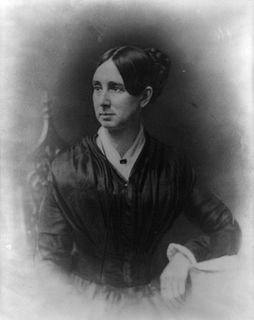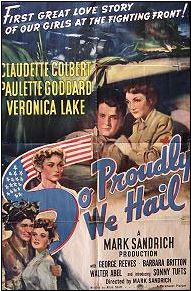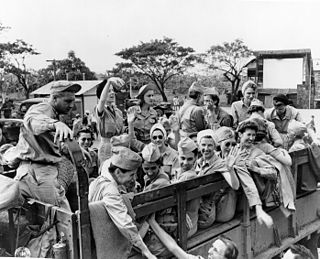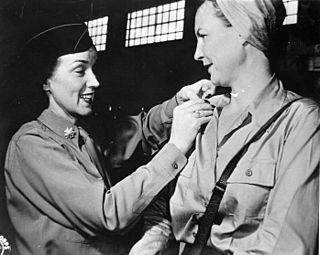
Louisa May Alcott was an American novelist, short story writer, and poet best known as the author of the novel Little Women (1868) and its sequels Little Men (1871) and Jo's Boys (1886). Raised in New England by her transcendentalist parents, Abigail May and Amos Bronson Alcott, she grew up among many well-known intellectuals of the day, such as Ralph Waldo Emerson, Nathaniel Hawthorne, Henry David Thoreau, and Henry Wadsworth Longfellow.

Dorothea Lynde Dix was an American advocate on behalf of the indigent mentally ill who, through a vigorous and sustained program of lobbying state legislatures and the United States Congress, created the first generation of American mental asylums. During the Civil War, she served as a Superintendent of Army Nurses.

The Bataan Death March was the forcible transfer by the Imperial Japanese Army of between 60,000 and 80,000 American and Filipino prisoners of war from Saysain Point, Bagac, Bataan and Mariveles to Camp O'Donnell, Capas, Tarlac, via San Fernando, Pampanga, the prisoners being forced to march despite many dying on the journey.

The United States Navy Nurse Corps was officially established by Congress in 1908; however, unofficially, women had been working as nurses aboard Navy ships and in Navy hospitals for nearly 100 years. The Corps was all-female until 1965.

So Proudly We Hail! is a 1943 American war film directed and produced by Mark Sandrich and starring Claudette Colbert, Paulette Goddard – who was nominated for an Academy Award for Best Supporting Actress for her performance – and Veronica Lake. Also featuring George Reeves, it was produced and released by Paramount Pictures.

Colonel Ruby Bradley was a United States Army Nurse Corps officer, a prisoner of the Japanese in World War II, and one of the most decorated women in the United States military. She was a native of Spencer, West Virginia but lived in Falls Church, Virginia, for over 50 years.

Mabel Keaton Staupers was a pioneer in the American nursing profession. Faced with racial discrimination after graduating from nursing school, Staupers became an advocate for racial equality in the nursing profession.

Ann Agnes Bernatitus was a United States Navy nurse who served during World War II. She was the first American recipient of the Legion of Merit
General John McE. Hyde was a ferry boat built for the War Department by Charles Ward Engineering Works. The ferry was assigned to provide transportation services among the military facilities in Manila Bay, the Philippines under administrative command of the Coast Artillery Corps.

The Angels of Bataan were the members of the United States Army Nurse Corps and the United States Navy Nurse Corps who were stationed in the Philippines at the outset of the Pacific War and served during the Battle of the Philippines (1941–1942). When Bataan and Corregidor fell, 11 navy nurses, 66 army nurses, and 1 nurse-anesthetist were captured and imprisoned in and around Manila. They continued to serve as a nursing unit while prisoners of war. After years of hardship, they were finally liberated in February 1945.

Laura Mae Cobb was a member of the United States Navy Nurse Corps who served during World War II. She received numerous decorations for her actions as a POW of the Japanese, during which she continued to serve as Chief Nurse for eleven other imprisoned Navy nurses—known as the "Twelve Anchors. She retired from the Nurse Corps as a Lieutenant Commander in 1947.

The United States Army Nurse Corps was formally established by the U.S. Congress in 1901. It is one of the six medical special branches of officers which – along with medical enlisted soldiers – comprise the Army Medical Department (AMEDD). The ANC is the nursing service for the U.S. Army and provides nursing staff in support of the Department of Defense medical plans. The ANC is composed entirely of Registered Nurses (RNs).

There have been women in the United States Army since the Revolutionary War, and women continue to serve in it today. As of 2020, there were 74,592 total women on active duty in the US Army, with 16,987 serving as officers and 57,605 enlisted. While the Army has the highest number of total active duty members, the ratio of women-men is lower than the US Air Force and the US Navy, with women making up 15.5% of total active duty Army in 2020.
Josephine May Nesbit was an American nurse who served in the Army Nurse Corps. She was second-in-command of the Angels of Bataan, Army nurses stationed in the Philippine Islands during World War II who were the largest group of American women taken as prisoners of war. Nesbit was noted for her "humane, dynamic leadership style." She was credited with the survival of the nurses during the years they were held in captivity at Santo Tomas Internment Camp.

Maude C. Davison was a Canadian-born, American nurse. After a career in Canada, she moved to the United States. She served as the Chief Nurse of the United States Army Nurse Corps in the Philippines during World War II. She received numerous awards for her military service in both World War I and World War II. In 2001, she posthumously was granted a Distinguished Service Medal for her leadership of the Angels of Bataan, the first and largest group of American military women taken as Prisoners of War.

Lieutenant Colonel Juanita Redmond Hipps was a US Army nurse during World War II. She was present in the Philippines during the early part of the war and was regarded as one of the Angels of Bataan. A bestselling book she wrote about her experiences formed the background for the 1943 war movie So Proudly We Hail! Hipps helped to establish the United States Air Force's flight nurse program. She remained with the army until her retirement in 1969 and traveled the world on postings alongside her husband, a US Air Force general. The US Air Force Association's highest award for nursing is named in her honor.
Sternberg General Hospital or Department Hospital, Manila P was a United States Military Hospital in Manila in the Philippines during the early part of the 20th century. The hospital was renamed after George Miller Sternberg on June 26, 1920.

Dorothy Still Danner was an American Navy nurse in World War II, and, as a prisoner of war held by the Japanese from 1942 to 1945, one of the Twelve Anchors.

Goldia Aimee O'Haver Merrill was a United States Navy nurse who was held a prisoner of war in the Philippines during World War II, one of the Twelve Anchors.















